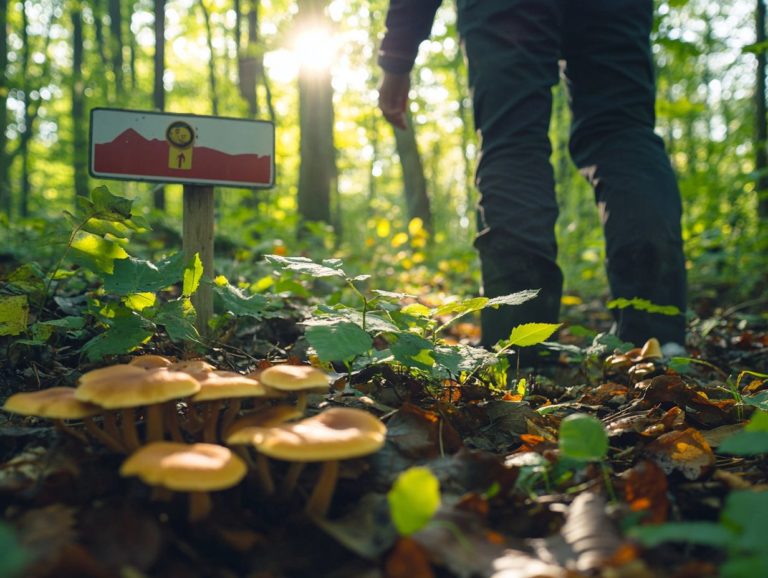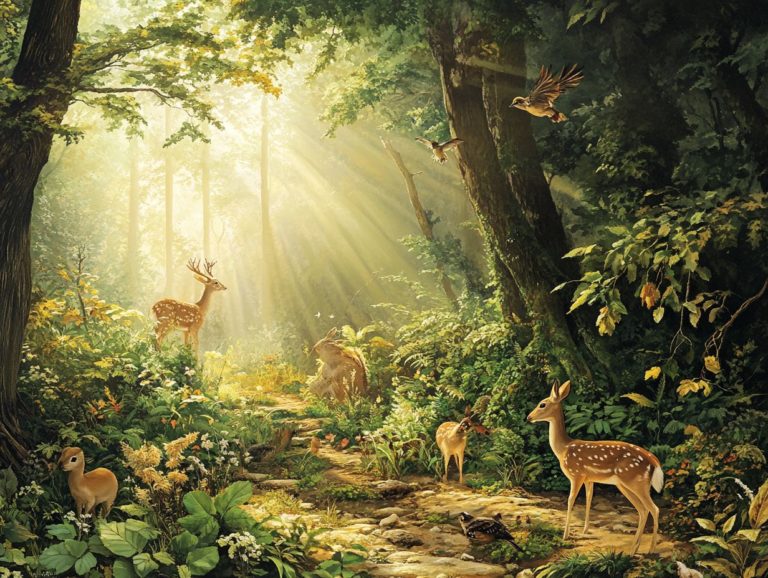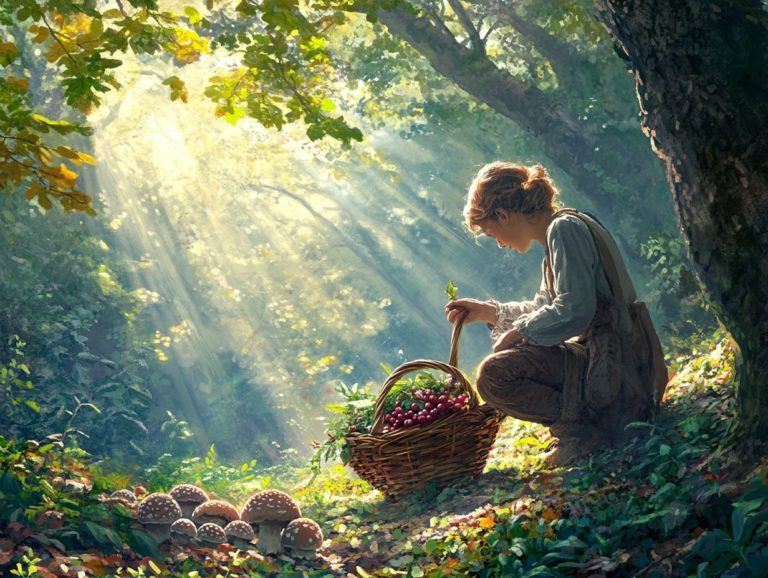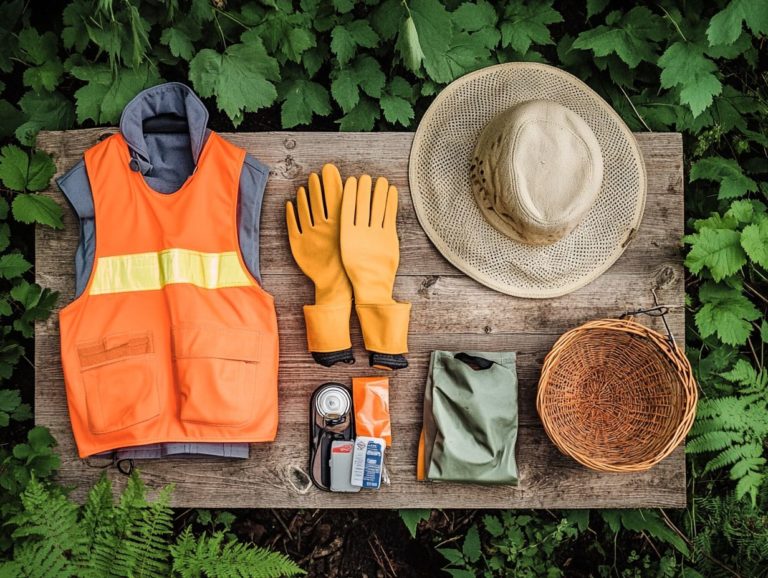Foraging Responsibly: 5 Key Principles
Foraging offers a rewarding opportunity to connect with nature, discover unique flavors, and embrace sustainability by learning about wild and edible plants. Don t miss out on this chance to connect with nature!
It’s essential to approach this practice with mindfulness and respect, especially as a new forager.
In this article, you will explore five key principles of responsible and sustainable foraging:
- Knowing exactly what you re foraging for and how to identify plants in your area
- Respecting the environment
- Understanding any laws and regulations surrounding wild harvesting
- Avoiding overharvesting
- Practicing ethical foraging
We will also explore the benefits and risks associated with foraging, providing you with tips to make a positive impact while savoring the great outdoors. It s important to have a well-stocked first aid kit as you embark on your foraging adventures.
Join in as you uncover the essentials of foraging responsibly!
Contents
- Key Takeaways:
- 1. Know What You Are Foraging For
- 2. Respect the Environment
- 3. Understand the Laws and Regulations
- 4. Avoid Overharvesting
- 5. Practice Ethical Foraging
- What Is Foraging and Why Is It Important?
- What Are Some Tips for Sustainable Foraging?
- How Can One Make a Positive Impact Through Foraging?
- Frequently Asked Questions
- What are the 5 key principles of foraging responsibly?
- What are some examples of laws and regulations to follow when foraging?
- How can I respect the environment while foraging?
- What does it mean to forage sustainably?
- Why is it important to be prepared when foraging?
- How can I give back to the land while foraging?
Key Takeaways:
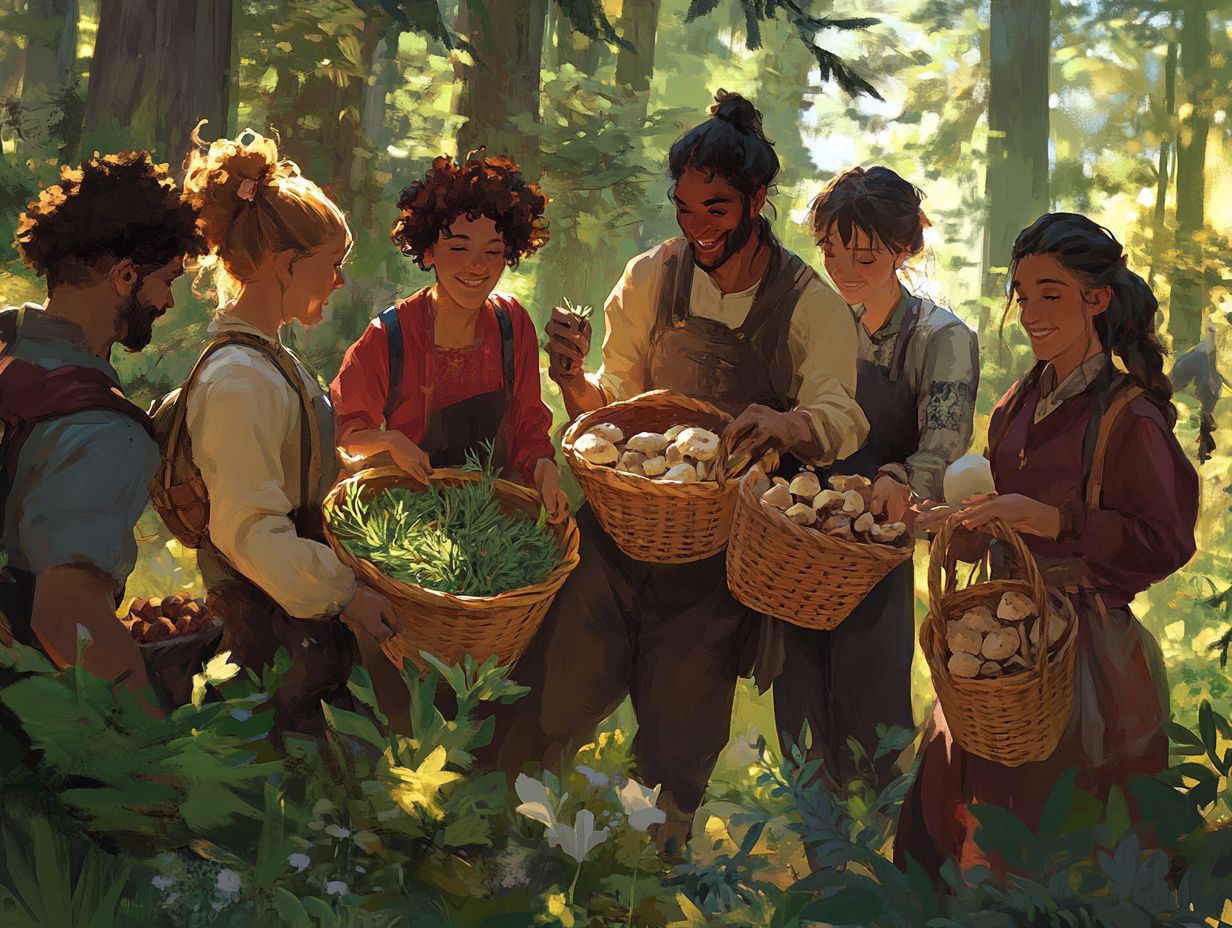
- Always know what you are foraging for and ensure it is safe and legal to consume.
- Treat the environment with respect by following Leave No Trace principles, which guide you to enjoy nature responsibly by minimizing your impact.
- Be aware of laws and regulations regarding foraging, such as obtaining permits or avoiding protected areas.
1. Know What You Are Foraging For
Foraging is an age-old practice that invites you to reconnect with nature and harness the potential of wild plants. However, knowing exactly what to forage is essential for both your safety and the sustainability of the ecosystem. It requires a keen understanding of the plant species that flourish in your area, such as dandelion, common mallow, and purslane, which can serve culinary or medicinal purposes.
As a new forager, focus on sharpening your plant identification skills to steer clear of toxic varieties while cultivating a sense of common sense during your harvesting adventures.
Accurate identification not only safeguards your well-being but also enriches your foraging experience, unveiling the diverse flavors and healing properties these plants can offer. Take stinging nettle, for example it s a nutrient powerhouse. Meanwhile, chickweed can work wonders on skin irritations. Always carry a well-stocked first aid kit; even the most cautious foragers can mistakenly ingest the wrong plant. Essentials like activated charcoal or antihistamines can be truly life-saving.
Grasping the medicinal qualities of these wild plants can elevate a simple foraging trip into an enlightening journey, allowing you to truly appreciate both the bounty of nature and the wisdom rooted in traditional herbal practices.
2. Respect the Environment
Respecting the environment while foraging is essential to ensure the sustainability of wild harvesting practices and minimize your impact on the environment. Embracing approaches like sustainable foraging and Leave No Trace principles will guide you to tread lightly on the land, steering clear of herbicides and safeguarding native plant populations.
Ethical foraging practices highlight the importance of obtaining permission when foraging on private land, as well as being mindful of protected species and areas. By choosing to forage sustainably, you can play a pivotal role in fostering biodiversity, allowing local ecosystems to thrive rather than deplete. For those looking to enhance their skills, following the top 5 tips for successful foraging can be invaluable. Sustainable methods also promote food sovereignty, enabling you and your community to reclaim your relationship with nature and enhance resilience.
As a conscious forager, you not only respect the wild but also cultivate relationships with fellow community members, creating a culture of stewardship towards the land that sustains you.
3. Understand the Laws and Regulations
Understanding the laws around foraging is crucial for your legal compliance. It also helps preserve local ecosystems, especially in areas like National Parks where specific restrictions may exist.
Familiarize yourself with local rules governing what you can harvest and how much. This knowledge is essential to avoid taking too much from nature.
Many protected areas impose seasonal restrictions to safeguard wildlife and plant reproduction cycles. Staying informed is key.
Local classes provide valuable education on laws, including indigenous rights. They also help you connect with knowledgeable foragers eager to share best practices.
Embracing a proactive approach to research and connecting with regional foraging groups will enable you to adapt to changing regulations and promote sustainable foraging practices.
4. Avoid Overharvesting
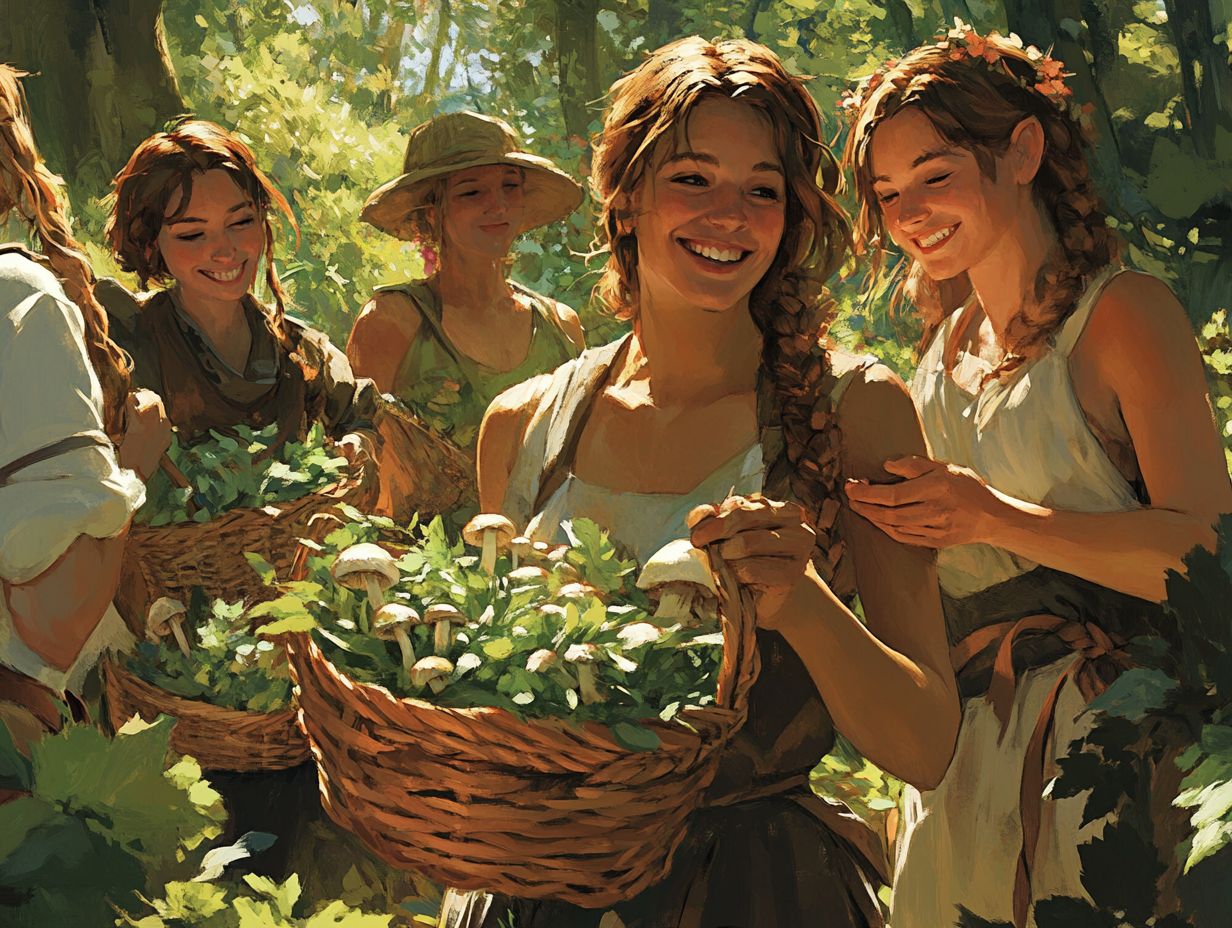
Avoiding overharvesting is a cornerstone of sustainable foraging. To learn more about this practice, it’s important to understand the ethical guidelines for foraging, which safeguard native plants and ensure future generations can enjoy an abundance of edible species.
This thoughtful practice enhances food sovereignty, meaning having control over the food we grow and eat, and nurtures biodiversity, maintaining ecological balance.
To effectively embrace this principle, set personal limits based on your observations of plant populations and seasonal availability. It’s also important to understand foraging ethics and recognize how many specimens can be harvested responsibly.
Educating novice foragers about these practices fosters a sense of responsibility and reverence for nature. Sharing insights about preserving plant populations promotes sustainable habits.
This collective knowledge cultivates a community dedicated to protecting natural resources for generations to come.
5. Practice Ethical Foraging
Ethical foraging is essential for respecting communities and promoting food sovereignty. By acknowledging the cultural significance of wild plants, you engage in a mindful harvesting approach, ensuring you follow guidelines like foraging sensibly.
As you embark on your foraging adventures, connect with local communities and seek permission when foraging on private lands. This fosters responsibility and respect for the environment, which is crucial for protecting nature through sustainable foraging techniques.
Joining local foraging groups allows you to learn diverse harvesting techniques and share valuable experiences that contribute to sustainable practices.
These communities serve as platforms for discussing the cultural importance of certain plants and the health of ecosystems. Collaborative learning enriches your knowledge and appreciation for nature s bounty.
This not only sharpens your personal skills but also plays a vital role in protecting natural resources for future generations.
What Is Foraging and Why Is It Important?
Foraging is the art of gathering wild plants, including edible ones, for food, medicine, and various other uses. This skill has been passed down through generations and holds immense cultural and ecological significance, linking us to our ancestors. It enables you to embrace food sovereignty and fosters a profound connection with your landscape. You also gain insights into the environmental impact of your consumption choices. You unlock the medicinal benefits of native plants, too!
This ancient tradition harks back to your ancestors, who relied on the natural bounty around them for survival, much like the practices of Native people. Today, foraging is experiencing a revival as more individuals seek sustainable methods to source their food in a world increasingly dominated by industrial agriculture. By embracing foraging, you discover a vibrant array of flavors and nutrients while deepening your appreciation for local ecosystems.
Communities worldwide celebrate foraging as a cultural practice. They often host workshops and foraging events that educate others about the intricate relationship between humans and nature. These initiatives encourage personal well-being and contribute to conservation efforts, fostering a respectful relationship with the land and its resources.
What Are the Benefits of Foraging Responsibly?
Foraging responsibly offers many benefits, from improved health to heightened environmental awareness. This practice deepens your connection to the natural world. By engaging with wild plants, you can access fresh, nutritious foods and cultivate a respectful relationship with nature.
Not only does foraging boost your personal health with the vitamins and minerals abundant in wild edibles, but it also helps reduce your ecological footprint. This means less reliance on commercially produced goods. Embracing locally sourced foraged foods allows you to support sustainability initiatives and actively engage with your community, fostering a shared sense of stewardship over local ecosystems.
Responsible foraging enhances your understanding of biodiversity, allowing you to appreciate the delicate balance of your surroundings. It encourages practices that protect native flora and fauna for generations to come.
What Are the Risks of Foraging Irresponsibly?
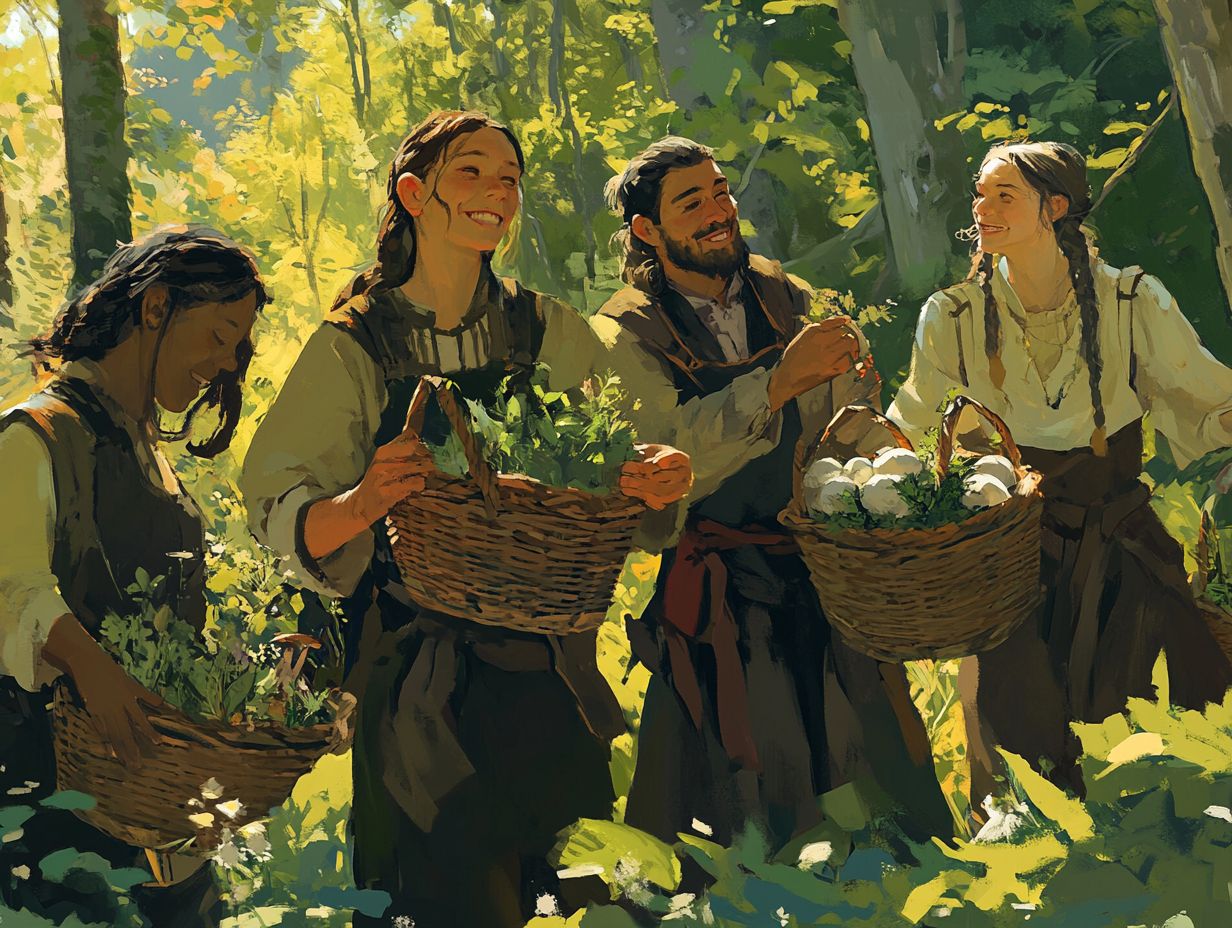
Foraging irresponsibly isn t just a gamble with your health; it also threatens the environment. Misidentifying plants can lead to toxic ingestion and contribute to the decline of native species. Such missteps undermine sustainable foraging and can have lasting negative impacts on local ecosystems.
Without a solid grasp of botany, the study of plants, you may easily confuse edible varieties with their toxic counterparts. This invites severe health repercussions that range from gastrointestinal distress to life-threatening conditions. Overharvesting certain species can wreak havoc on local populations, diminishing biodiversity and endangering invaluable flora.
To navigate the world of foraging safely, tap into community resources like workshops and guided expeditions. These avenues provide crucial education on proper identification techniques and sustainable practices, including using foraging techniques in responsible living. Doing so deepens your appreciation for nature and ensures that foraging remains a safe and responsible endeavor.
How Can One Educate Themselves on Responsible Foraging?
Educating yourself on responsible foraging is crucial for minimizing risks and maximizing the benefits of wild harvesting. You can achieve this through various channels, including local classes, workshops, and foraging groups. These resources offer invaluable insights into plant identification, sustainable practices, and the intricacies of local ecosystems.
Delving into literature on foraging will deepen your understanding and provide diverse perspectives. Online communities offer platforms for sharing experiences and asking questions. Engaging with seasoned foragers can be particularly enlightening; they often share firsthand knowledge and tips that are invaluable for both beginners and those looking to sharpen their skills.
Continuous learning in this field enhances your abilities and cultivates a greater appreciation for nature’s bounty. This reinforces the importance of responsible harvesting and stewardship of the land, ensuring you become a more conscientious forager.
What Are Some Tips for Sustainable Foraging?
Sustainable foraging is essential for conserving ecosystems. By following specific tips from our guide on how to forage responsibly, you can enhance your wild harvesting practices while minimizing your environmental impact. Techniques like rotating your harvest sites, taking only what you need, and respecting seasonal growth patterns are key to fostering sustainability.
Incorporating these strategies into your daily routine not only protects the environment but also deepens your appreciation for local flora and fauna. Being mindful of where and when you forage can make a significant difference to local biodiversity. For instance, choosing areas with plenty of growth helps prevent overharvesting.
Learning to identify native plants ensures that your foraging efforts support local ecosystems rather than disrupt them. Embracing gratitude for the natural bounty and recognizing the interconnectedness of all living things elevates your foraging experience and inspires more conscientious harvesting habits.
How Can One Make a Positive Impact Through Foraging?
You can make a meaningful impact through foraging by prioritizing local ecosystems, supporting food sovereignty initiatives, and honoring indigenous rights. This approach helps the community and the environment.
Engaging in respectful wild harvesting fosters awareness and deepens your appreciation for native plants and their vital roles in both culture and ecology.
By actively participating in local conservation efforts, you can help restore habitats and protect endangered species. Your foraging can be exciting and fulfilling, not just personally rewarding, but also beneficial for the environment.
Sharing your knowledge about sustainable practices enables others to forage responsibly, creating a ripple effect that enhances the understanding of the delicate balance between humans and nature.
As you reflect on your foraging activities, think about how your choices affect nature. This mindfulness can inspire meaningful conversations about sustainability, ethical harvesting techniques, and the cultural significance of native flora.
Frequently Asked Questions
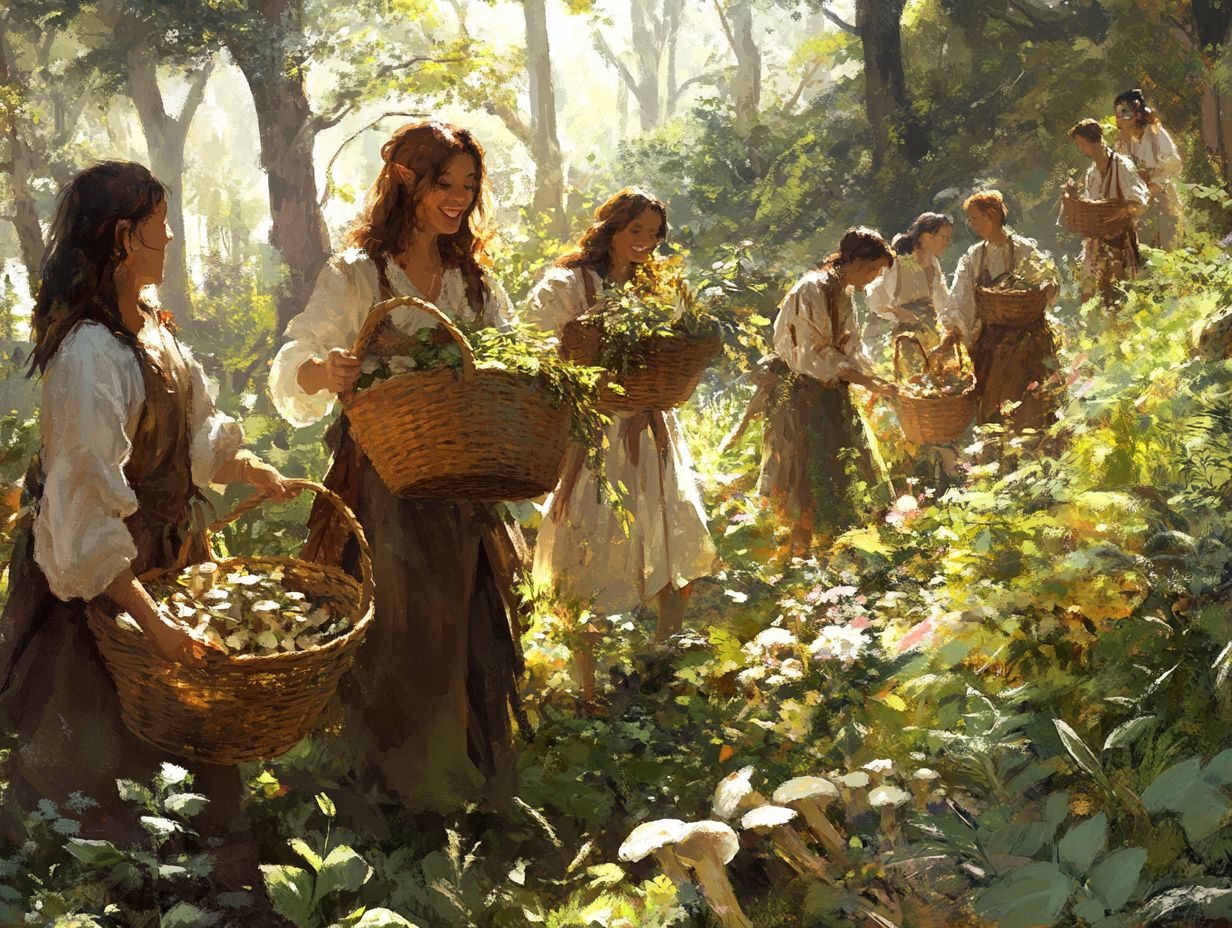
What are the 5 key principles of foraging responsibly?
You can follow the 5 key principles of foraging responsibly: knowing the laws and regulations, respecting the environment, being prepared, foraging sustainably, and giving back to the land.
What are some examples of laws and regulations to follow when foraging?
Examples of laws and regulations to follow when foraging include obtaining necessary permits, respecting property boundaries, and following season and quantity restrictions.
How can I respect the environment while foraging?
To respect the environment while foraging, stay on designated trails, avoid damaging plants and trees, and leave no trace of your presence.
What does it mean to forage sustainably?
Foraging sustainably means only taking what you need, not over-harvesting, and following foraging techniques for sustainable practices to leave enough for the plants and animals to thrive.
Why is it important to be prepared when foraging?
Being prepared when foraging means having the necessary tools and knowledge to identify and handle plants properly, as well as emergency supplies for accidents or getting lost.
How can I give back to the land while foraging?
You can give back to the land while foraging by participating in clean-up efforts, supporting conservation organizations, and educating others about responsible foraging practices.
Ready to make a difference through foraging? Start your journey towards sustainable foraging today!


